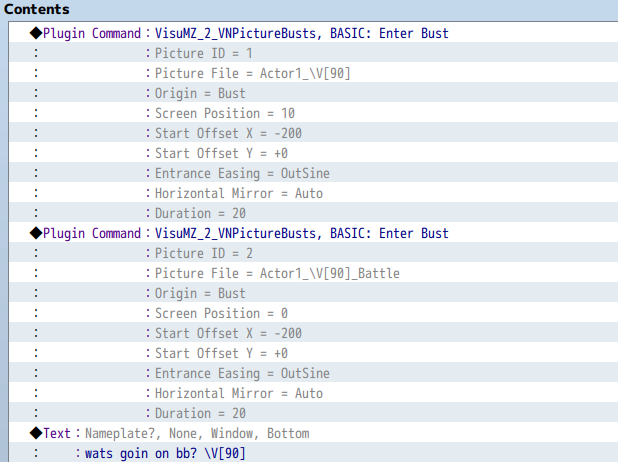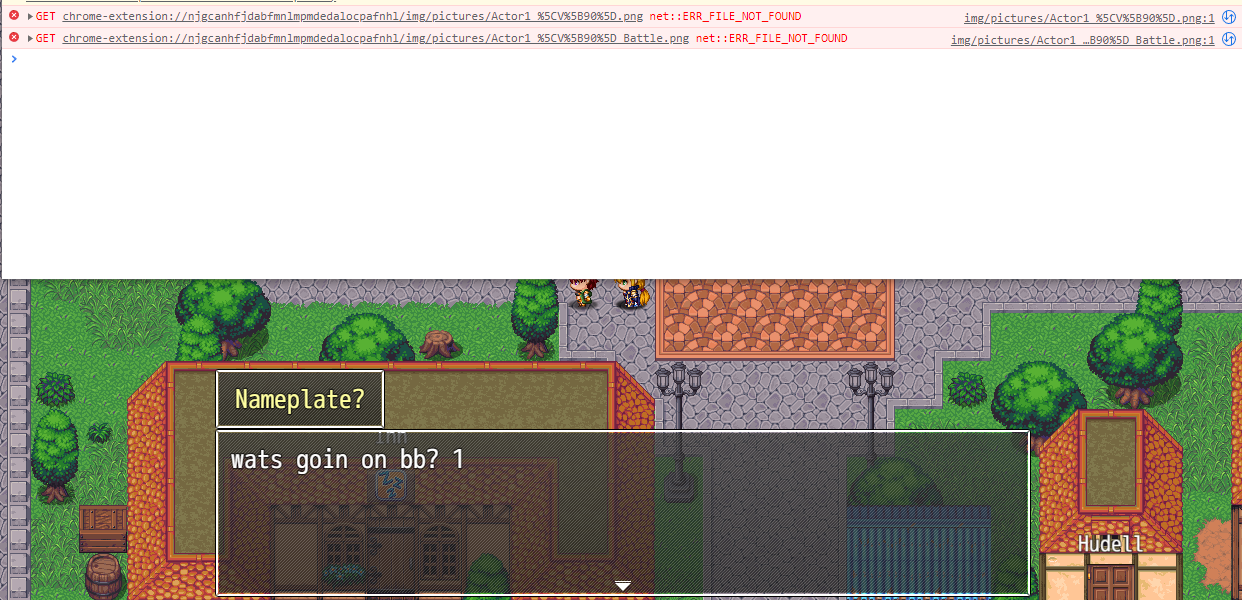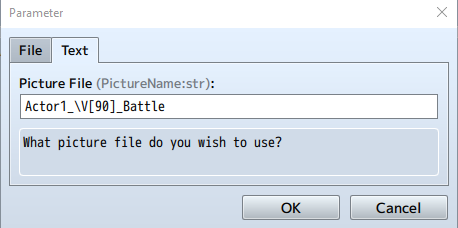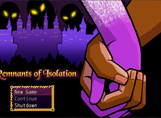RED_NOVA'S PROFILE
Red_Nova

Sir Redd of Novus: He who made Prayer of the Faithless that one time, and that was pretty dang rad! :D
9192
RMN's Most Humblest!



Prayer of the Faithless
On the brink of the apocalypse, two friends struggle to find what is worth saving

On the brink of the apocalypse, two friends struggle to find what is worth saving
Search
Filter
 The Geterix Legacy Review
The Geterix Legacy Review
Thanks for the review, lobo! I'm glad you liked it. As for a sequel expectation, I didn't really plan to do anything else with this game after the event, but I didn't have time to sit down and resolve all the plot points that were brought up in the first half. That's why I left the endings more open so players can draw their own conclusions on how the story plays out from there.
Still, though. I'm glad you liked what was here. Writing banter between Meurig and Trixie was my favorite part of taking over the project.
Still, though. I'm glad you liked what was here. Writing banter between Meurig and Trixie was my favorite part of taking over the project.
 [RMMZ] Referencing Variables in Plugin Command
[RMMZ] Referencing Variables in Plugin Command
The more I look into it, the less sure I am that message window text is handled the same as plugin command text. Setting up variable calls in both plugin commands and the message window...

...results in the value being accepted correctly in the message box but not in the plugin command:

I get the same result for all the different escape characters I can think of. Even referencing $GameVariables doesn't work. I see other plugin commands that accept an eval text rather than a string, so that makes me think the plugin itself won't accept any references. Since the failure to reference a portrait actually causes the game to crash, I've submitted a report to VisuStella team and will report back with what I learn.

...results in the value being accepted correctly in the message box but not in the plugin command:

I get the same result for all the different escape characters I can think of. Even referencing $GameVariables doesn't work. I see other plugin commands that accept an eval text rather than a string, so that makes me think the plugin itself won't accept any references. Since the failure to reference a portrait actually causes the game to crash, I've submitted a report to VisuStella team and will report back with what I learn.
 [RMMZ] Referencing Variables in Plugin Command
[RMMZ] Referencing Variables in Plugin Command
So I'm learning RMMZ and am trying out VisuStella's Visual Novel Busts plugin. When trying to reference a specific bust, I want to be able to append a variable value at the end of a file name. Something like this:

\V{90} isn't being evaluated into a variable value like I want, and I can't change the code itself since the plugin is obfuscated. Am I missing the correct syntax for this? Or is there really no way to reference a variable when calling a bust?
I'm not even sure if this is a VisuStella issue, a RMMZ one, or just operator error. Any assistance on this would be appreciated.

\V{90} isn't being evaluated into a variable value like I want, and I can't change the code itself since the plugin is obfuscated. Am I missing the correct syntax for this? Or is there really no way to reference a variable when calling a bust?
I'm not even sure if this is a VisuStella issue, a RMMZ one, or just operator error. Any assistance on this would be appreciated.
 [RMMZ] Referencing Variables in Plugin Command
[RMMZ] Referencing Variables in Plugin Command
So I'm learning RMMZ and am trying out VisuStella's Visual Novel Busts plugin. When trying to reference a specific bust, I want to be able to append a variable value at the end of a file name. Something like this:

\V[90] isn't being evaluated into a variable value like I want, and I can't change the code itself since the plugin is obfuscated. Am I missing the correct syntax for this? Or is there really no way to reference a variable when calling a bust?
I'm not even sure if this is a VisuStella issue, a RMMZ one, or just operator error. Any assistance on this would be appreciated.

\V[90] isn't being evaluated into a variable value like I want, and I can't change the code itself since the plugin is obfuscated. Am I missing the correct syntax for this? Or is there really no way to reference a variable when calling a bust?
I'm not even sure if this is a VisuStella issue, a RMMZ one, or just operator error. Any assistance on this would be appreciated.
 Finally, a Progress Chart
Finally, a Progress Chart
Nice to see progress is, well, progressing!
Please don't hustle too much just to get out a demo. Working on Prayer of the Faithless for so long has taught me how dangerous committing to system mechanics too early can be. If you release a demo with the promise of having save files carried over into the final game, locking in how the game works at this early stage can be just as confining as it can be liberating.
Take your time, and even consider releasing a small beta/prototype instead of a full demo just to get feedback on how some systems work if you really feel like you must put something out there. Regardless of how you plan to proceed, please stay at a pace that you're comfortable with. I'm rooting for you!
Please don't hustle too much just to get out a demo. Working on Prayer of the Faithless for so long has taught me how dangerous committing to system mechanics too early can be. If you release a demo with the promise of having save files carried over into the final game, locking in how the game works at this early stage can be just as confining as it can be liberating.
Take your time, and even consider releasing a small beta/prototype instead of a full demo just to get feedback on how some systems work if you really feel like you must put something out there. Regardless of how you plan to proceed, please stay at a pace that you're comfortable with. I'm rooting for you!
 Is this site dead? Newcomer.
Is this site dead? Newcomer.
There are old fogies like me who prefer the long form, deliberate pacing of the forums instead of Discord. Different places even under the same banner can have different user bases.
 If Twitter kicks the bucket, might start posting my game design thoughts here or Tumblr
If Twitter kicks the bucket, might start posting my game design thoughts here or Tumblr
 Empty objects in dungeon exploration
Empty objects in dungeon exploration
It's important to understand what you want the player to get out of exploring your game. "Interesting" and "annoying" are very nebulous metrics that will vary wildly from player to player, and even from developer to developer. Until it's understood what kind of non-critical content you want to go for, then it will be extremely difficult to nail down what would make it interesting for the player.
The way I see it, there is a key factor that separates the two exploration types listed in the OP: The nature of the goal. In Zelda, Lufia 2, etc. the goal is clear and rigid: get to the end of the dungeon, beat the boss, and move on to the next one. Anything that doesn't contribute directly to progress towards that goal can feel like weight on the player that can get overwhelming when in excess.
Fallout, Skyrim, and Phoenix Wright operate differently on a fundamental level. Their goals aren't as clearly defined and simple to achieve as those in the first category. You don't know exactly what you're looking for, so you have to start looking around the world. Fallout 4's main plot involves finding your son with little to no hints to go on. Ace Attorney games require you to piece together a mystery, so you often won't know what will be critical pieces of evidence until the moment you come across them. If you don't make direct progress towards the goal, players still treated to character banter, worldbuilding, and other non-critical information that most players playing these kinds of games would appreciate anyway.
The reason why I spend those last paragraphs not answering your questions is because what can be seen as engaging and exciting for one type of exploration will likely not work for the other type, and vice versa. Correct me if I'm wrong here, but it sounds almost like the question of the topic is to see what kind of exploration rewards that would work for the second type of game could appeal to a player of the first type of game. Unfortunately, I don't think there is an answer to that. If the game is too focused on the completion of that goal, then just about any kind of non-critical dialogue will grate on the player. The only thing I can think of right now is to relax the rigidity of the main goal and to use the exploration of seemingly inane objects part of the fun of finding the way to solve the main goal, rather than contribute to solving the main goal itself.
If there is still determination to try and fit in exploration elements into a more goal-oriented game, then I think it might be best to go for a more subtle approach. Take the Souls series for example: item descriptions and environment design can provide plenty of lore and backstory for those who want to dig into it without directly interfering with the goal of reaching the end of the dungeon and fighting the boss. Getting a new weapon can be a direct benefit for the goal oriented player, and those that want more context and open the weapon's item description for the context that they want.
The way I see it, there is a key factor that separates the two exploration types listed in the OP: The nature of the goal. In Zelda, Lufia 2, etc. the goal is clear and rigid: get to the end of the dungeon, beat the boss, and move on to the next one. Anything that doesn't contribute directly to progress towards that goal can feel like weight on the player that can get overwhelming when in excess.
Fallout, Skyrim, and Phoenix Wright operate differently on a fundamental level. Their goals aren't as clearly defined and simple to achieve as those in the first category. You don't know exactly what you're looking for, so you have to start looking around the world. Fallout 4's main plot involves finding your son with little to no hints to go on. Ace Attorney games require you to piece together a mystery, so you often won't know what will be critical pieces of evidence until the moment you come across them. If you don't make direct progress towards the goal, players still treated to character banter, worldbuilding, and other non-critical information that most players playing these kinds of games would appreciate anyway.
The reason why I spend those last paragraphs not answering your questions is because what can be seen as engaging and exciting for one type of exploration will likely not work for the other type, and vice versa. Correct me if I'm wrong here, but it sounds almost like the question of the topic is to see what kind of exploration rewards that would work for the second type of game could appeal to a player of the first type of game. Unfortunately, I don't think there is an answer to that. If the game is too focused on the completion of that goal, then just about any kind of non-critical dialogue will grate on the player. The only thing I can think of right now is to relax the rigidity of the main goal and to use the exploration of seemingly inane objects part of the fun of finding the way to solve the main goal, rather than contribute to solving the main goal itself.
If there is still determination to try and fit in exploration elements into a more goal-oriented game, then I think it might be best to go for a more subtle approach. Take the Souls series for example: item descriptions and environment design can provide plenty of lore and backstory for those who want to dig into it without directly interfering with the goal of reaching the end of the dungeon and fighting the boss. Getting a new weapon can be a direct benefit for the goal oriented player, and those that want more context and open the weapon's item description for the context that they want.
















